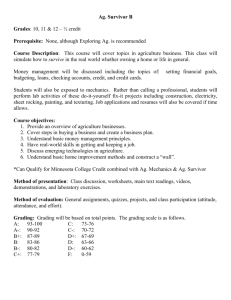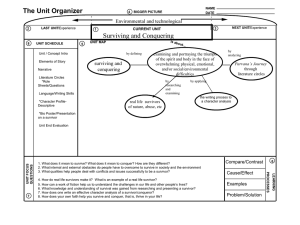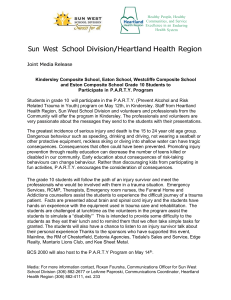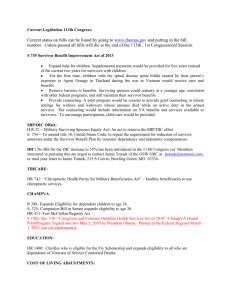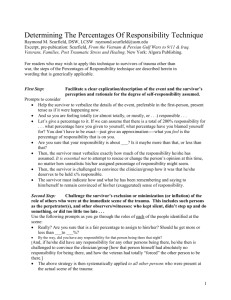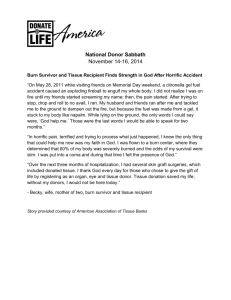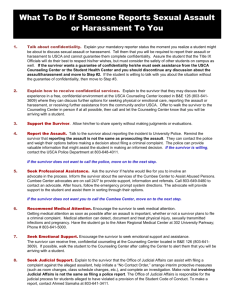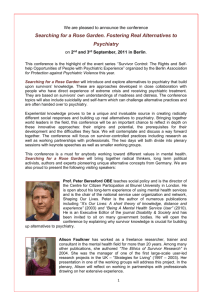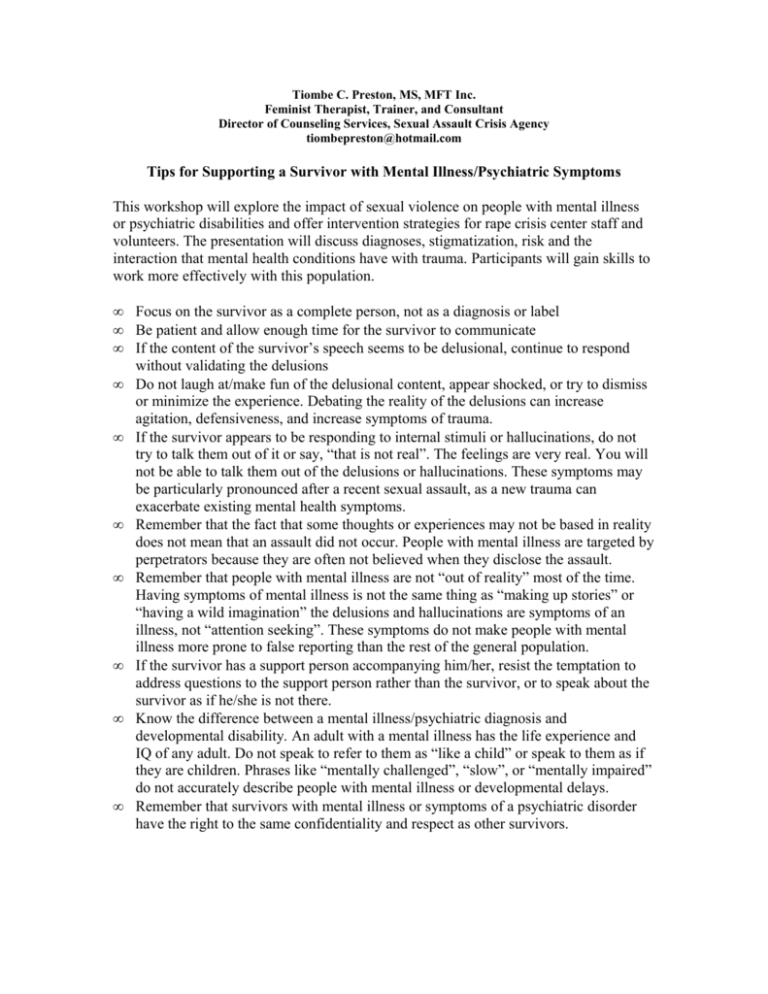
Tiombe C. Preston, MS, MFT Inc.
Feminist Therapist, Trainer, and Consultant
Director of Counseling Services, Sexual Assault Crisis Agency
tiombepreston@hotmail.com
Tips for Supporting a Survivor with Mental Illness/Psychiatric Symptoms
This workshop will explore the impact of sexual violence on people with mental illness
or psychiatric disabilities and offer intervention strategies for rape crisis center staff and
volunteers. The presentation will discuss diagnoses, stigmatization, risk and the
interaction that mental health conditions have with trauma. Participants will gain skills to
work more effectively with this population.
•
•
•
•
•
•
•
•
•
•
Focus on the survivor as a complete person, not as a diagnosis or label
Be patient and allow enough time for the survivor to communicate
If the content of the survivor’s speech seems to be delusional, continue to respond
without validating the delusions
Do not laugh at/make fun of the delusional content, appear shocked, or try to dismiss
or minimize the experience. Debating the reality of the delusions can increase
agitation, defensiveness, and increase symptoms of trauma.
If the survivor appears to be responding to internal stimuli or hallucinations, do not
try to talk them out of it or say, “that is not real”. The feelings are very real. You will
not be able to talk them out of the delusions or hallucinations. These symptoms may
be particularly pronounced after a recent sexual assault, as a new trauma can
exacerbate existing mental health symptoms.
Remember that the fact that some thoughts or experiences may not be based in reality
does not mean that an assault did not occur. People with mental illness are targeted by
perpetrators because they are often not believed when they disclose the assault.
Remember that people with mental illness are not “out of reality” most of the time.
Having symptoms of mental illness is not the same thing as “making up stories” or
“having a wild imagination” the delusions and hallucinations are symptoms of an
illness, not “attention seeking”. These symptoms do not make people with mental
illness more prone to false reporting than the rest of the general population.
If the survivor has a support person accompanying him/her, resist the temptation to
address questions to the support person rather than the survivor, or to speak about the
survivor as if he/she is not there.
Know the difference between a mental illness/psychiatric diagnosis and
developmental disability. An adult with a mental illness has the life experience and
IQ of any adult. Do not speak to refer to them as “like a child” or speak to them as if
they are children. Phrases like “mentally challenged”, “slow”, or “mentally impaired”
do not accurately describe people with mental illness or developmental delays.
Remember that survivors with mental illness or symptoms of a psychiatric disorder
have the right to the same confidentiality and respect as other survivors.
Tips for supporting a survivor with a possible mental illness who is agitated
•
•
•
•
•
•
•
•
•
•
•
Maintain a calm demeanor. If the survivor’s affect becomes escalated, become even
calmer.
Take the time to find out why the survivor is reporting, disclosing, or calling your
center. What outcome are they expecting or hoping to find?
If this is during the SART process, find out if the survivor wants to continue to
participate in reporting the sexual assault
Remember that it is common for survivors, especially those with mental illness to use
alcohol or drugs to self-medicate or cope with symptoms of trauma and other mental
health conditions
Understand that people with psychiatric disorders face tremendous stigma and are
often veterans of many “social service” and “mental health” systems and services.
Many have lived on the streets and have been victimized and treated as invisible or
less than human. Many have not experienced being treated with respect, being
listened to, or validated—make this a different experience.
Clearly explain your services and any limitations (“It sounds like you are dealing with
a terrible situation, I am so sorry -- we do not provide housing, but we do have some
referrals I can give you.”)
Specifically address issues such as confidentiality and honestly disclose to the
survivor if any information given in the report will be shared and with whom (i.e. if
you work in the District Attorney’s office for Victim Witness) or could possibly be
used against the survivor (this is especially important if the survivor is possibly
uncooperative due to being a known sex worker or being under the influence of
alcohol or drugs)
Be clear that being at high risk for sexual assault (being a sex worker, drinking
excessively, a teen sneaking out to “date” a much older man, going with a known
drug dealer, gang member, or parolee to take drugs, dancing/drinking/passing out at a
party or on the streets/in a “drug” house, taking or being sedated by psychiatric
medications, etc.) does not cause it. Many survivors are agitated and defensive due to
feeling self-blame and are anticipating being blamed by others.
When at all possible, explain why you need certain information or are asking detailed
questions about the survivor’s history, behaviors, past mental health services,
medications, etc. This will aid in decreasing defensiveness.
Allow time for the survivor to begin to calm down, asking basic, less challenging
questions first
If the survivor is becoming increasingly agitated, try to discern if this is being caused
by a substance, trauma, or other mental health symptoms. If there was recent alcohol
or drug use, it is best to see the survivor when sober. Counseling should not occur
with an intoxicated person.
The Intersections of Rape Trauma Syndrome and Other Mental Health Diagnoses
SYMPTOM FROM DSM
SYMPTOM OF RTS
Schizophrenia and other Psychotic Disorders
disorganized behavior
difficulty concentrating, reduction in awareness, increase
in risky behaviors
paranoia
hypervigilance
hallucinations
flashbacks/nightmares
delusions
cognitive distortions
affective flattening
restricted range of affect, numbing of responsiveness
lack of goal directed behavior (i.e. organization of meals, inability to mobilize assistance/resources clinically
self care, etc.)
significant impairment in social/occupational/academic
functioning
Mood Disorders
loss of interest
sadness, lethargy/fatigue, emptiness, numbness,
anhedonia
feelings of worthlessness and undue guilt
thoughts of death or suicide
inability to concentrate, indecisiveness, flight of ideas,
distractibility
increased goal directed behavior
increased energy
sleep disturbances
pressure to keep talking
excessive involvement in pleasurable activities
that have high potential for painful consequences
marked decrease of interest/participation in important
activities
sadness, lethargy, unable to feel love, joy
self-blame, worthlessness
sense of impending doom, suicidal ideations/attempts,
sense of a foreshortened future
reduction in awareness (being in a daze), difficulty
concentrating
perfectionism (efforts to regain control)
increased arousal (hypervigilance)
sleep disturbances/nightmares
pressure to continually disclose assault
increased risky behavior
Dissociative Disorders
amnesia
unexpected travel or absence from work/school
inability to recall an important aspect of the trauma
marked decrease in interest or participation in important
activities, clinically significant impairment in
social/occupational/academic functioning
apparent presence of two distinct identities
description of feeling like one person before the assault
and another after, outward adjustment phase (person is
perceived as functioning, yet internally is experiencing
severe crisis)
feeling of detachment from one’s body or thoughts
feeling detached or estranged from others, efforts to avoid
thoughts, feelings, and activities that remind one of
trauma
incomplete memories
inability to recall important aspects of the trauma
Anxiety Disorders
avoidance behaviors
avoiding reminders of the assault
obsessions
intrusive thoughts
somatic complaints
body memory during flashback
agoraphobia
inability to mobilize assistance/resources, avoiding
people, places, activities associated with traumatic event
Do not use without prior permission of the authors-- L. McFarlane and T. Preston.

